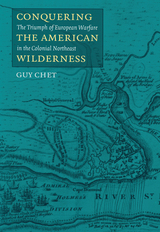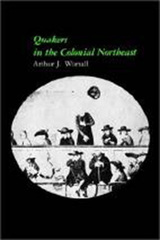2 books about Colonial Northeast

Conquering the American Wilderness
The Triumph of European Warfare in the Colonial Northeast
Guy Chet
University of Massachusetts Press, 2003
A study of military tactics and strategy before the War of Independence, this book reexamines the conquest of the North American wilderness and its native peoples by colonial settlers. Historians have long believed that the peculiar conditions of the New World, coupled with the success of Indians tactics, forced the colonists to abandon traditional European methods of warfare and to develop a new "American" style of combat. By combining firearms with guerrilla-like native tactics, colonial commanders were able not only to subdue their Indian adversaries but eventually to prevail against more conventionally trained British forces during the American Revolution. Yet upon closer scrutiny, this common understanding of early American warfare turns out to be more myth than reality. As Guy Chet reveals, clashes between colonial and Indian forces during the seventeenth and eighteenth centuries did not lead to a reevaluation and transformation of conventional military doctrine. On the contrary, the poor performance of the settlers during King Philip's War (1675–76) and King William's War (1689–1697) prompted colonial magistrates to address the shortcomings of their military forces through a greater reliance on British troops and imperial administrators. Thus, as the eighteenth century wore on, growing military success in the New England colonies reflected an increasing degree of British planning, administration, participation, and command. The colonies' military and political leadership, Chet argues, never rejected the time-tested principles of European warfare, and even during the American War of Independence, the republic's military leadership looked to Europe for guidance in the art of combat.
[more]

Quakers in the Colonial Northeast
Arthur J. Worrall
University Press of New England, 2002
This book traces the Quaker experience in New England and New York from the Arrival of the first English Quaker missionaries in 1646 to 1790. The first Friends faced considerable hostility, so much so that it took almost eighty years for Quakers and their antagonists to solve their differences. By then, Quakers had settled into a comfortable period of numerical increase, and, to the extent that colonies permitted, participated as individuals in colonial political life. During the early eighteenth century Quaker organizational and disciplinary structures derived from the late seventeenth century underwent gradual evolution, but not to the extent of altering the basically comfortable arrangement that served to promote the growth of Friends. After 1750, however, Quakers throughout the colonies entered a period of reform, a reform that led to a numerical decline in older centers and to a drastic reduction in numerical growth. Reform ultimately caused Friends to sharpen their positions on antislavery and pacifism and led to a withdrawal from political participation. Ultimately, it pointed the way to the disastrous nineteenth-century Quaker schisms.
[more]
READERS
Browse our collection.
PUBLISHERS
See BiblioVault's publisher services.
STUDENT SERVICES
Files for college accessibility offices.
UChicago Accessibility Resources
home | accessibility | search | about | contact us
BiblioVault ® 2001 - 2024
The University of Chicago Press









